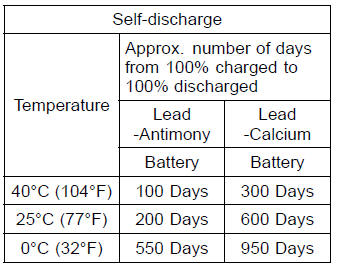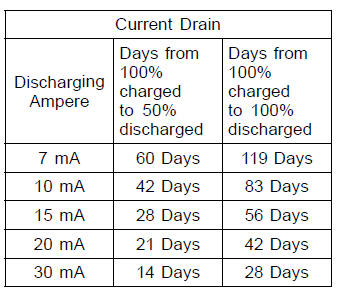

The battery installed in this motorcycle is a sealed type, so it is not necessary to check the battery electrolyte level or add distilled water.
The sealing strip should not be pulled off once the specified electrolyte has been installed in the battery for initial service.
However, in order to maximize battery life and ensure that it will provide the power needed to start the motorcycle you must properly maintain the battery’s charge. When used regularly, the charging system in the motorcycle helps keep the battery fully charged. If your motorcycle is only used occasionally or for short periods of time, the battery is more likely to discharge.
Due to their internal composition, batteries continually self discharge.
The discharge rate depends on the type of battery and ambient temperature.
As temperature rises, so does the discharge rate. Every 15°C (59°F) doubles the rate.
Electrical accessories, such as digital
clocks and computer memory, also
draw current from the battery even
when the key is switched off. Due to
a combination of such “key-off” draws
and hot temperature, a battery can go
from fully charged to completely discharged
in a matter of days.


In extremely cold weather the fluid in an inadequately charged battery can easily freeze, which can crack the case and buckle the plates. A fully charged battery can withstand sub-freezing temperature with no damage.
 Tire Wear, Damage
Tire Wear, Damage Battery Sulfation
Battery SulfationRebound Damping Force Adjustment
To adjust the rebound damping force, turn the rebound
damping adjuster [A].
The standard adjuster setting is the 3 3/4 turns out from
the fully clockwise position.
WARNINGIf both adjusters are not adjusted
equally, handling
may be impaired and a hazardous condition may
res ...
Location of parts
Clutch Lever
Left Handlebar Switches
Rebound Damping Force Adjuster
(Front Fork)
Compression damping force adjuster
(Front Fork)
Meter Instruments
Brake Fluid Reservoir (Front)
Right Handlebar Switches
Front Brake Lever
Throttle Grip
Ignition Switch/Steering Lock
Elect ...
Throttle Control System
Check the throttle grip play each day
before riding the motorcycle, and carry
out maintenance and adjustments in
accordance with the Periodic Maintenance
Chart. Adjust it if necessary.
Throttle Grip
The throttle grip controls the butterfly
valves in the throttle body. If the throttle
grip ha ...